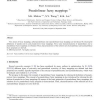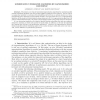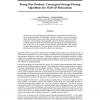52 search results - page 5 / 11 » Hyperbolic Programs, and Their Derivative Relaxations |
GLOBECOM
2009
IEEE
13 years 5 months ago
2009
IEEE
The received signal strength (RSS)-based approach to wireless localization offers the advantage of low cost and easy implementability. To circumvent the nonconvexity of the convent...
EOR
2007
13 years 7 months ago
2007
Two classes of fuzzy mappings, called pseudolinear and g-pseudolinear fuzzy mappings are introduced by relaxing the definitions of pseudo-convex and pseudo-invex fuzzy mappings. ...
BMCBI
2011
13 years 2 months ago
2011
Background: It is difficult to accurately interpret chromosomal correspondences such as true orthology and paralogy due to significant divergence of genomes from a common ancestor...
SIAMDM
2002
13 years 7 months ago
2002
We present a new class of randomized approximation algorithms for unrelated parallel machine scheduling problems with the average weighted completion time objective. The key idea i...
NIPS
2007
13 years 9 months ago
2007
We present a novel message passing algorithm for approximating the MAP problem in graphical models. The algorithm is similar in structure to max-product but unlike max-product it ...



